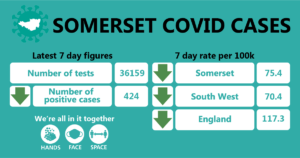This update is provided by the Somerset Covid-19 Engagement Board and is designed to provide a weekly update on the current Covid-19 situation in Somerset.
On Monday, the Prime Minister set out the roadmap to easing the restrictions that we’ve all been living with for so long now. While all of us will look forward to having a little more freedom, we must continue to exercise caution. We have two weeks of lockdown remaining and if we can collectively get our rates even lower, then we will start from March 8th in a stronger position.
As hard as it is to hear it, Covid-19 is not going away. We therefore must continue to stress the importance of sticking to the important principles of washing our hands, wearing a mask, avoiding touching our face, and keeping our distance from anyone not in our household or support bubble. These simple measures really do work. It’s also important to let as much fresh air into your home or workspace as possible.
While our case rates have dropped again from last week, we are still seeing sporadic cases across the county, and a combination of easing restrictions and testing more people in coming weeks could see our rates rise again. As always, we will be monitoring this situation very closely.
As we said last week, please do have your vaccination when it is offered to you. The focus of the vaccine programme at present is on reducing severe symptoms and death. As we as learn more from the vaccines, it will become clearer to what extent it will affect us passing the virus to others.
For now, there is a chance that even if you are vaccinated, you could still inadvertently pass the virus onto someone who hasn’t received their vaccine yet, and they could become seriously ill.
‘Remember, everyone can catch it, anyone can spread it’.



| David Fothergill, Leader of Somerset County Council Twitter: @DJAFothergill | Trudi Grant, Director of Public Health Twitter: @SomersetDPH | Clare Paul, Cabinet Member for Public Health and Wellbeing Twitter: @Clarepaul_ |
Somerset’s seven-day infection rate has decreased from last week’s rate of 81.1 and now stands at 75.4 new cases per 100,000.

In the week leading up to 20 February, approximately 36,159 tests were carried out across the county and there have been 424 new confirmed cases.
The Somerset Dashboard which tracks our local epidemic from the start in March, to the current time.
Workplaces: There has been a lot of coverage about outbreaks in factories, but we are also seeing outbreaks in office-based businesses such as accountants, solicitors and estate agents. It’s important to remember that working from home where you can is the best protection. If you do need to be in the office working with others, stick to the hands, face and space rules as much as possible, but be aware that by even following those rules, if there is someone in a poorly ventilated office who is asymptomatic or pre-symptomatic, they may very easily be able to pass the virus onto others. Spending several hours in an office with someone who is carrying the virus, even using face-coverings and two metre distancing, is a significant risk, as the viral particles will build up in the air. That is why it is crucially important to ventilate the office, ideally continuously, but if not by regularly opening windows to freshen the air. So, make sure you dress warmly for work and ventilate, ventilate, ventilate!
Care Sector: In the seven days to 20 February there has been 51 cases across 43 care home settings. The positive cases identified were staff and residents; we continue to support these settings with support and guidance on prevention measures.
For all the latest information and guidance related to Covid19 visit Coronavirus updates for Somerset Adult Care Providers – Somerset Safeguarding Adults Board (safeguardingsomerset.org.uk).
This week, the Department for Health and Social Care (DHSC) and Public Health team held another webinar with local care providers, to discuss the latest guidance and how together we continue to protect the health and well-being of our Somerset residents who are in receipt of care in a range of settings.
Schools and Early Years settings: Following the announcement made by the Prime Minister on Monday, all schools and colleges will be welcoming students back to face to face education from March 8th. We want to take this opportunity to thank all our educational staff who have worked so hard throughout this lockdown period to provide ongoing education for our children and young people. We also need to thank the children, young people, their families and carers who have adapted so well to these challenging times. We can’t wait to see everyone back at school.
In order to help keep our schools and other educational settings as safe as we can, all education staff now have access to regular testing which they can do at home. Students attending secondary schools, FE Colleges and special schools will also have access to testing on their return to school and then on an ongoing basis at home. This is a really important step forward as we aim to keep community rates of the virus low and keep as many children and young people as possible in face to face learning. Further information on the return to school is available here.
Communications:
Route-map out of lockdown: Until March 8th we remain under a period of national lockdown, and as before, we encourage you to share the following poster with your networks to help explain the restrictions: England Lockdown: Stay At Home posters – GOV.UK (www.gov.uk)
As the route out of lockdown is on everyone’s minds this week, Clinton Rogers’ Covid Catch Up film is dedicated to the subject and features an interview with Trudi, who shares some of her thoughts about the months ahead. As always, please do watch and share this film with your networks. You can find it on YouTube.
Getting tested: We have had feedback that it is hard to keep track of all the national and local testing programmes and so we have now brought these together into one page on our website. We hope this will serve as ‘one stop shop’ for advice on ‘Who, When, Why, How and Where’ people can get tested for covid19 Coronavirus – Getting tested (somerset.gov.uk)
Ventilation: It is important to remember that coronavirus mainly spreads through the air, and a poll taken last month suggests that many people still do not realise that opening windows is one of the best ways to avoid catching it. So, here is a best-practice reminder for you to share please:
In addition to social distancing and other measures, you can also reduce the risk of spreading Covid-19 by:
- Letting plenty of fresh air into your home or room without getting uncomfortably cold. This is especially important if people are coming into your home (for permitted reasons)
- Avoid coming into contact with people in spaces with limited flow of fresh air such as rooms with windows that are never opened
To increase the flow of air you can:
- open windows as much as possible
- open doors
- make sure that any vents (for example at the top of a window) are open and airflow is not blocked
- leave extractor fans (for example in bathrooms) running for longer than usual with the door closed after someone has used the room
Covid-19 Vaccine: It has been announced that, as advised by the Joint Committee on Vaccination (JCVI) everyone on the GP learning disability register will now be included in priority group six. This means 150,000 people (nationally) at higher risk with severe disabilities will be offered their vaccination more quickly.
As mentioned earlier in this update, we continue to work hard to reinforce the message that the vaccine is designed to prevent serious illness and death from Covid-19. Even if you have had the vaccine, you can still catch it and might still be able to pass it on, so the hands, face, space guidance must still be followed to protect yourselves and others.
Please help us by sharing the below with your networks:
- If you haven’t had a vaccine yet,
- If you have had one dose of the vaccine,
- If you have had 2 doses of the vaccine,
The message is the same, we all need to STAY AT HOME where possible and keep following the HANDS FACE SPACE guidance to keep ourselves and others safe.
Resources and further information: Please do keep an eye our Healthy Somerset website, which has a huge amount of information and resources to help keep everyone healthy happy and safe at this time.
For the latest local information as well as digital resources, posters and flyers please visit the Somerset County Council website.
The Somerset Local Outbreak Management Plan outlines how we, the council, will work with the NHS Test and Trace Service, PHE, the NHS and other partners to ensure a whole system approach to preventing and managing local outbreaks. This can be found here.
Finally, please like them on Facebook, follow them on Twitter and share their posts with your networks to help us in communicating these important messages. Follow the Director of Public Health account too here.

